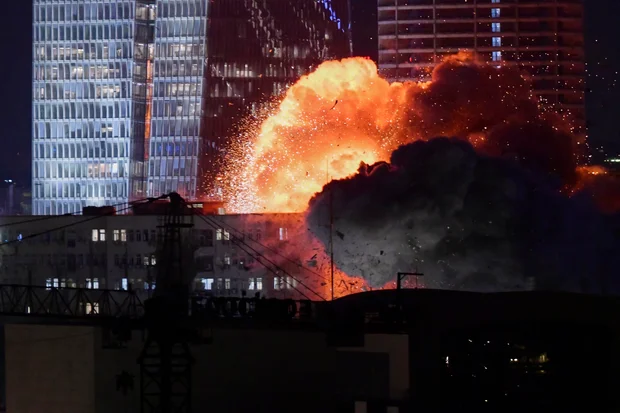Summary –
- Israel attacked Iran first, hitting nuclear sites and military targets in Tehran to stop what it claims is Iran’s secret nuclear weapons program.
- Iran hit back – firing missiles at Israeli cities like Tel Aviv and Rishon Lezion. Two people in Israel died, and 20+ were injured.
- In Iran, the Israeli strikes killed 78 people and injured 320, including some top military officers.
- Important places like Iran’s Natanz nuclear site were hit. But Iran says key reactors like Fordo and Bushehr are safe for now.
- Nuclear talks between Iran and the US were supposed to happen Sunday—but may be cancelled because of the attack.
- Both sides are warning of more attacks. Israel says Iran crossed the line. Iran says more retaliation is coming.
Tel Aviv/Tehran, June 14, 2025 – A fierce escalation between Iran and Israel has left both nations reeling from casualties, destruction, and fears of a wider regional conflict, as missile strikes continue to rain across major cities.
Iran launched a series of missile attacks targeting Israel overnight, in retaliation for what Tehran called an “unprecedented two-pronged” Israeli assault on its nuclear facilities and military leadership. Sirens blared into Saturday morning across Tel Aviv and Jerusalem, with explosions reported in several urban areas.
One person was killed and over 20 were injured after an Iranian missile struck near residential buildings in Rishon Lezion, just south of Tel Aviv. Emergency crews rushed to the scene, rescuing trapped civilians from rubble.
“This is a difficult and complex scene and we are still continuing to scan and ensure that there are no additional victims,” said Rami Musher, Deputy Director of Ayalon region’s emergency services.
A second fatality was reported in Ramat Gan, where a woman was killed by falling debris. Israel’s envoy to the U.S. stated that around 40 people had been injured in total due to the strikes.
In Iran, the toll from Israel’s earlier attack is even more severe. Iranian officials claim at least 78 deaths, including senior military leaders, and over 320 injured, most of whom are civilians.
Israel Targets Iranian Nuclear Infrastructure
On Friday, Israel launched a major assault on Iranian soil, striking dozens of defense-related targets in Tehran, including surface-to-air missile systems and two Iranian air force bases used for missile and drone operations — Hamadan in western Iran and Tabriz in the northwest.
“We damaged – and will continue to damage – strategic sites and enemy sources of knowledge,” said Israeli Air Force Chief MG Tomer Bar, emphasizing the operation’s strategic importance.
The Israeli Defense Forces (IDF) also confirmed it had struck the Natanz nuclear enrichment site, damaging its underground infrastructure, including centrifuge halls and electrical rooms.
Nuclear Sites and Talks in Jeopardy
The UN’s International Atomic Energy Agency (IAEA) said it was in contact with Iranian authorities, who claimed that the highly secured Fordo nuclear site was not impacted. However, explosions were reported near the site and an Israeli drone was reportedly shot down.
The Bushehr Nuclear Power Plant was also spared, and no increase in radiation was observed at Natanz, according to IAEA’s findings.
Amid the escalating conflict, the future of U.S.-Iran nuclear negotiations remains uncertain. A sixth round of talks was scheduled for Sunday, but Iranian lawmaker Aladdin Boroujerdi indicated that those plans may now be canceled following Israel’s strikes.
“With Israel’s actions, the sixth round of negotiations with the United States will probably not be held,” Iranian lawmaker Aladdin Boroujerdi stated.
Warnings and Retaliation
Israel’s Defense Minister Israel Katz condemned Iran’s missile attacks on civilian centers and vowed a “very heavy price.” Prime Minister Benjamin Netanyahu echoed the sentiment, warning Iran that “more is on the way.”
On the other side, Iran has promised to intensify its retaliation and warned regional countries against supporting Israel, threatening to target their military bases.
As the international community, including NATO, urges de-escalation, the situation remains volatile, with both nations showing no sign of backing down.
(Inputs- CNN & CBS)








